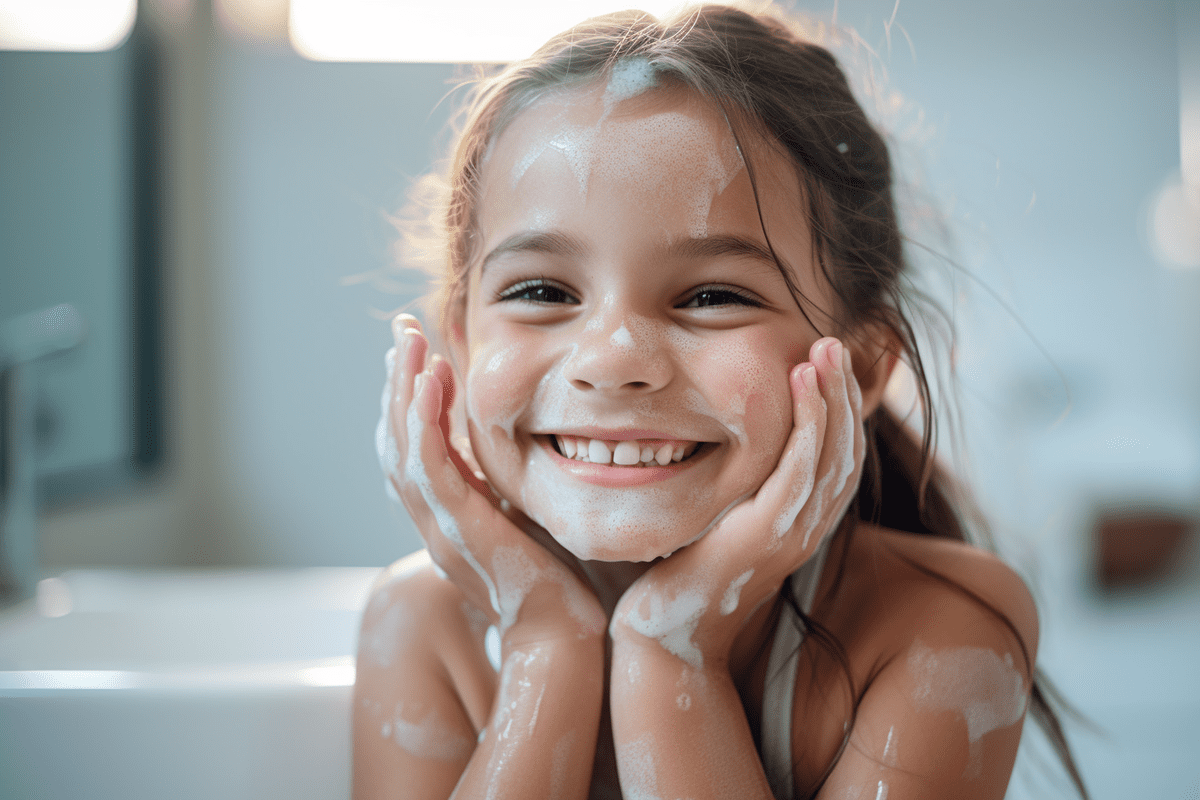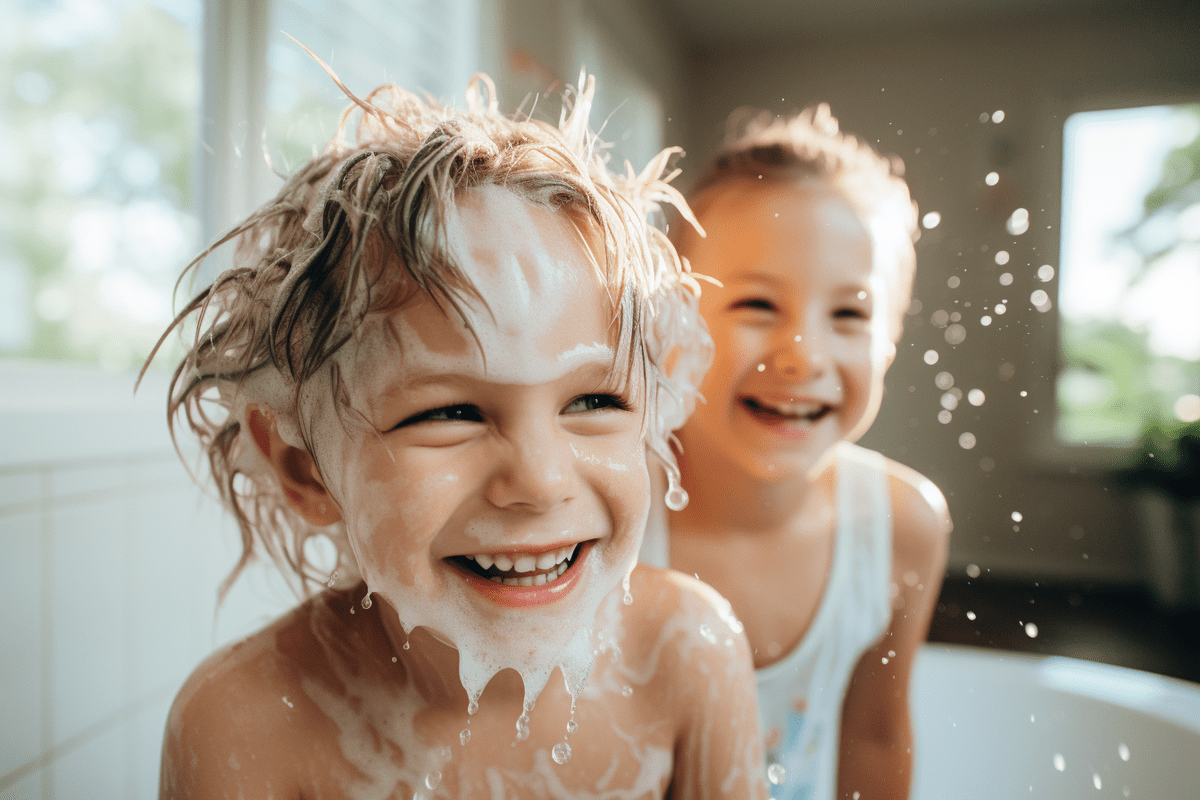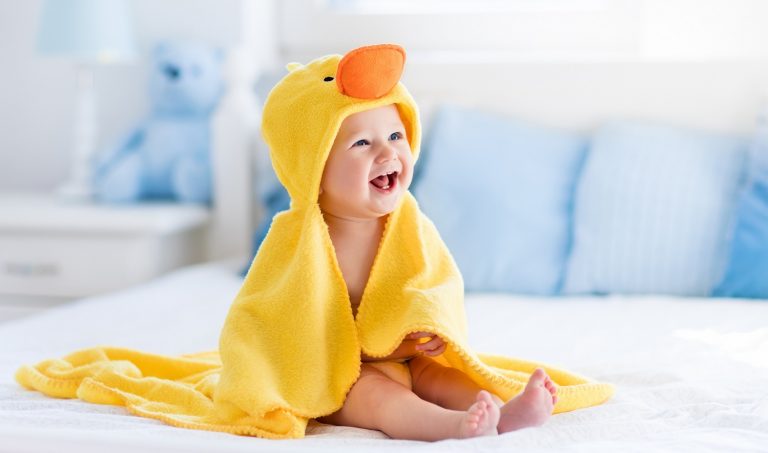When it comes to parenting, we often need to decide when our child should start teaching achieve certain milestones. One milestone that often confuses parents is when their child should start using a face wash.
Understanding when to introduce face wash into a child’s skincare regimen is key. It helps protect their sensitive skin and lays the foundation for healthy habits. According to the Indian Academy of Pediatrics, it is recommended to start introducing mild face wash to children around the age of 7-10 years old.
But how can you tell if your child is ready for face wash? In this guide, we will discuss the signs that your child is ready for a face wash and some important tips to keep in mind when introducing your kids understand this new step into their skincare routine.
In This Article
Understanding the Skin: Kids vs Adults
Before we dive into when kids should really start washing and using face wash, it’s important to understand the difference between their skin and adults’ skin.
Kids’ Skin
Children’s skin is more sensitive compared to adults bodies‘ skin. It’s thinner and more delicate, making it susceptible to irritation and damage from harsh skincare products.
For this reason, children should use gentle, hypoallergenic, and non-comedogenic cleansers and moisturizers formulated specifically for their tender skin. Products containing harsh ingredients like salicylic acid and benzoyl peroxide, commonly found in adult skincare products, can be too strong for their skin and may cause irritation or dryness.
Starting a skincare routine at a young age instills good skincare habits, helps maintain beautiful skin, and teaches kids the importance of taking care of their largest organ – their skin.
Adults’ Skin
Adults’ skin, on the other hand, can handle stronger skincare products. Their skin is thicker and less sensitive thus, it can tolerate ingredients like salicylic acid and benzoyl peroxide, which are effective in treating skin issues like acne and hyperpigmentation.
However, despite being less sensitive, adult skin still requires care and protection. A proper skincare routine, which includes cleansing, toning, moisturizing, and sun protection, and skin care products is essential to maintain healthy skin and prevent aging signs. It’s important to use products that are suitable for the skin type and age to ensure skin health and prevent potential skin problems.

When Should Kids Can Use Face Wash?
As children grow, their skin evolves and becomes more susceptible to dirt, sweat, and excess oil. It’s essential to establish a skincare routine at the right age to maintain a child’s skin health.
During their teenage years between the ages of 7-10, kids start to become more independent and may want to do things on their own. This is a perfect time to introduce them to face wash and teach them how to take care of their skin properly. By starting them young, you can instill healthy skincare habits that will last a lifetime.
However, some experts suggest that basic skincare practices can start even a teen years earlier, at around age 6, with children being encouraged to cleanse away daily grime and sunscreen with a light cleanser.
Here are some factors that might influence this timeline:
- Skin Type: Children with oily skin may need to start using face wash earlier than those with dry or normal skin. This can help manage excess oil and prevent clogged pores.
- Environmental Factors: If a child is often outdoors and exposed to dirt, sweat, and pollutants, they might need to start a skincare routine earlier to keep their skin clean and healthy.
- Onset of Puberty: The hormonal changes during puberty often lead to increased oil production and acne. Starting a skincare routine at the onset of puberty can help manage these changes.
- Child’s Self-Esteem: Adolescence can be a challenging time for many kids. Skin issues can further impact a child’s self-esteem. However, starting a skincare routine early can help them feel more confident.
- Parental Guidance: Parental guidance is crucial in introducing a new step to a child’s skincare routine. Teach them proper techniques and ensure they use suitable products for their skin type.
Benefits of Starting Face Wash at the Right Age
Starting face wash at the right age can be beneficial for children, especially as they begin to grapple with common childhood skin issues like dirt, oil, and sweat. Here are some ways face wash can help:
- Managing Dirt: Children are naturally active, leading to the accumulation of dirt on their skin. Regular use of a gentle face wash can help remove this dirt, preventing it from clogging pores and causing skin issues like acne.
- Controlling Oil: With the onset of puberty, children’s skin tends to produce more oil. Using a face wash designed for oily skin can help regulate oil production and maintain a balanced, healthy complexion.
- Handling Sweat: Children often sweat more due to their high activity levels. A proper face wash can cleanse away sweat and prevent related skin problems like rashes or irritation.
Establishing a skincare routine early on also has several long-term benefits:
- Promotes Healthy Skin: A good skincare routine can help maintain the health and vitality of the skin by keeping it clean, properly moisturized, and protected from harmful environmental elements.
- Teaches Responsibility: When children start a skincare routine, they learn about personal responsibility and self-care, which are valuable life skills.
- Prepares for Future Skin Changes: An early skincare routine prepares children for future changes in their skin, especially during adolescence. It equips them with the knowledge and habits needed to navigate these changes effectively.
- Custom Care for Skin Types: Different skin types require different care. Starting early helps children understand their unique skin type (be it dry, oily, or combination) and choose products that best suit their needs.
- Sets Foundation for Lifelong Skincare Journey: A skincare routine started in childhood lays the foundation for lifelong skin health. It instills habits that will serve them well into adulthood, helping to delay signs of aging and maintain a youthful glow.
- Boosts Self-Confidence: A healthy complexion can boost a child’s self-confidence, making them feel good about themselves and their appearance.
Potential Risks of Using Adult Face Wash on Kids’
Using adult face wash on kids can pose several risks due to the differences in skin maturity and sensitivity. Here are some potential dangers:
- Harsh Ingredients: Adult face washes often contain stronger ingredients like salicylic acid, benzoyl peroxide, and alpha hydroxy acids. These can be too harsh for a child’s skin, leading to dryness, irritation, or even burns.
- Dehydration: Some adult cleansers are designed to remove excess oils, which can strip a child’s skin of its natural oils, causing dehydration and flakiness.
- Allergic Reactions: Certain fragrances, preservatives, and dyes used in adult face wash can trigger allergic reactions in children, resulting in red, itchy skin or rashes.
For example, a case reported in the Journal of Clinical and Aesthetic Dermatology highlighted a 9-year-old girl who developed severe skin irritation from using her mother’s face wash containing glycolic acid.
To avoid such risks, it’s crucial to use a gentle cleanser suitable for a child’s skin. These products are typically free of harsh chemicals and are designed to maintain the skin’s natural balance. They help remove dirt and dead skin cells without stripping the skin of its essential oils, promoting a healthy skincare routine.
How to Choose the Right Face Wash for Your Child?
Choosing the right face wash for kids is crucial in establishing good habits and promoting clear skin. Here’s what to look for in a child-friendly face wash:
- Gentle Ingredients: Children’s skin is more sensitive than adults’, so opt for face washes with gentle, non-irritating ingredients. Avoid products with harsh chemicals, artificial fragrances, or alcohol, which can dry out or irritate the skin.
- pH-Balanced: The skin’s natural pH level is slightly acidic, around 5.5. A face wash with a similar pH level can help maintain the skin’s natural balance and prevent dryness or irritation.
- Non-comedogenic: This means the product won’t clog pores, which is essential for preventing acne and other skin issues.
- Hypoallergenic: These products are less likely to cause allergic reactions. However, it’s always a good idea to do a patch test on a small area of your child’s skin before fully integrating a new product into their routine.
- Age-appropriate: Children’s skin is constantly changing, so it’s essential to use age-appropriate products. For toddlers and young children, use gentle cleansers that preserve natural oils. As they grow, introduce appropriate face washes based on their skin type.
- Fragrance-free: Fragrances can irritate the skin and may not be appealing to your child’s sensitive nose. Opt for unscented or fragrance-free face washes instead.
- Child-friendly Packaging: Look for pumps, foam dispensers, or squeeze tubes that are easy for your child to use independently. This can help make washing their face a more enjoyable experience.
Some recommended brands include:
- Cetaphil: This brand offers a range of gentle cleansers suitable for children, including their Cetaphil Gentle Cleansing Bar and Daily Facial Cleanser.
- The Honest Company: This brand offers a line of hypoallergenic, gentle face washes for children, including their Honest Purely Simple Hypoallergenic Face and Body Lotion.
- Johnson’s Baby: Known for its gentle and safe products for babies, Johnson’s Baby also offers a Head-to-Toe Baby Wash perfect for children’s delicate skin.
- Neutrogena: This brand offers a line of mild and gentle facial cleansers for children, such as their Neutrogena Ultra Gentle Daily Cleanser.
Tips to Help Your Child to Use Face Wash Correctly
To keep your child’s skin healthy, here are some helpful tips to keep in mind when introducing face wash into their bath time skincare routine:
- Make sure you choose a gentle cleanser suitable for your child’s age and skin type.
- Avoid cleansers with harsh chemicals or fragrances that can irritate their delicate skin.
- Teach your child how to properly use the face wash by gently massaging it onto the skin in circular motions, avoiding the eye area.
- Remind them to rinse their face thoroughly with lukewarm water and pat dry with a clean towel.
- Encourage your child to use face wash twice a day, in the morning and at night before bedtime.
- If your child has acne-prone skin, remind them not to scrub or rub their face too hard when washing to avoid further irritation.
- Play peek-a-boo with your child to make the face-washing process more fun and engaging for them.
- Please remind your child to always wash their hands before touching their face and using the face wash.
- Avoid wear makeup or sunscreen when using face wash, as this can prevent the cleanser from properly removing dirt and oil from the skin.
- Teach your child to moisturize their face after washing to keep it hydrated and protected.
- To follow a skin care routine consistently, make sure you keep the face wash easily accessible for your child.
- Be patient and remind your child that it takes time to see results from using face wash regularly.
- Always consult a pediatrician or dermatologist if your child experiences any negative reactions to the face wash.
Conclusion
To sum it up, introducing face wash into your child’s skincare routine is an essential step in promoting healthy skin habits and preventing skin issues. Here are some key takeaways to keep in mind:
- Choose a gentle and age-appropriate face wash with non-irritating, hypoallergenic, and fragrance-free ingredients.
- Encourage your child to use the face wash twice a day and rinse thoroughly with lukewarm water.
- Make sure the product is easy for your child to use independently.
Remember, with proper guidance and patience, you can help your child develop good skincare habits that will benefit them for years to come. So start early and make face washing an enjoyable stay healthy part of their daily routine!
FAQs
Can a 12-year girl use face wash?
Yes, a 12-year-old girl can use face wash. This is often the age when puberty begins, leading to increased oil production and potential skin issues. Opt for a gentle, kid-friendly face wash that's suitable for her skin type.
Is it OK for a 10-year-old to do skincare?
Yes, it's okay for a 10-year-old to start a basic skincare routine, which can include gentle cleansing and sun protection. It's important to choose products that are mild, hypoallergenic, and specifically formulated for children's sensitive skin.
Can a 5-year-old use face wash?
While a 5-year-old can use face wash, it's generally recommended to start regular facial cleansing around age 6. Before this, a gentle rinse with water is usually sufficient. Always choose products specifically designed for children's sensitive skin.
Is face wash safe for children?
Face wash can be safe for children if it's formulated specifically for their sensitive skin. Products should be mild, hypoallergenic, and free from harsh chemicals. Always supervise use and ensure they avoid contact with eyes and teeth. Consult a pediatrician for advice if needed.
REFERENCE:











